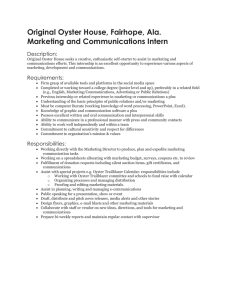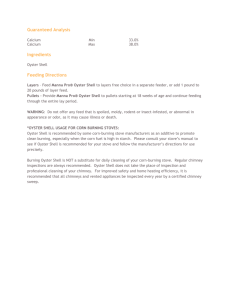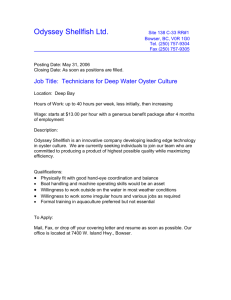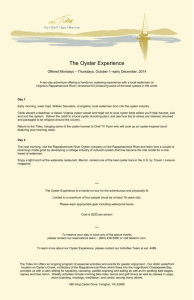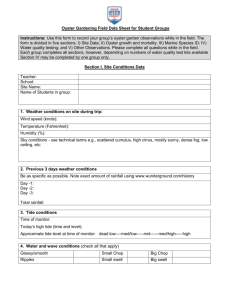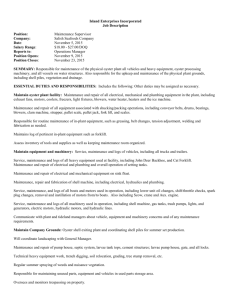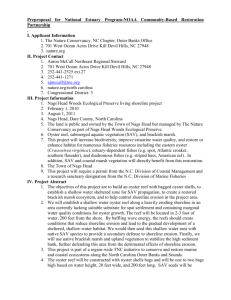MacDill Shoreline Stabilization Project
advertisement
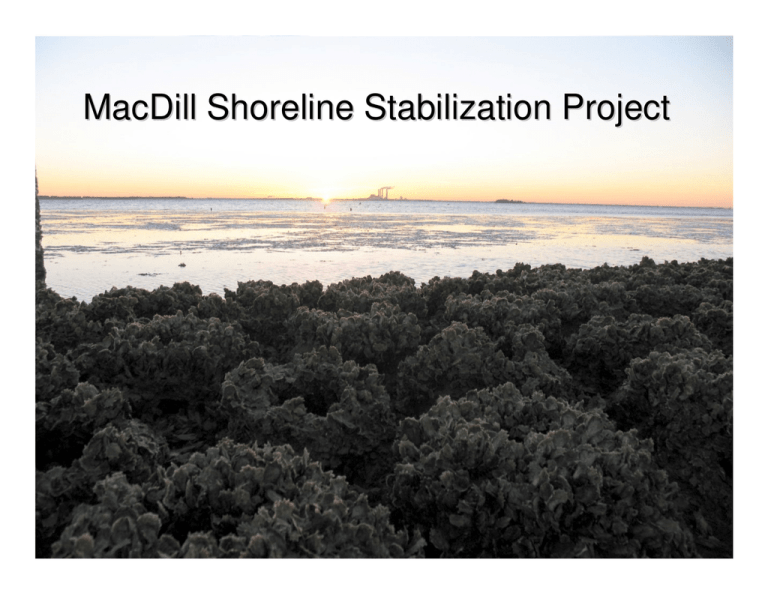
MacDill Shoreline Stabilization Project Phase I Phase IV Phase II and III The Problem Increased erosion along eastern shoreline, particularly at southeast corner • Loss of natural resources • Loss of coastal habitat • Impacts to archeological site (National Register eligible) • Impacts to government assets (golf course) Project Overview Five Year, Multi-Phase Project Partnering effort between DOD and USFWS with Tampa Bay Watch An innovative, low-tech, low cost approach for shoreline stabilization Triple benefit – shoreline stabilization, improves habitat diversity, water quality improvement Phase I Phase 2 & 3 Alternative Stabilization Approaches Before Planting Spartina alternaflora and seedling mangroves SWFWMD and local high school nursery program Two efforts, planted over 3,000 grass plugs during each event – both were washed away within days under normal conditions After Benefits •Benefit #1 – Shoreline Stabilization: Reduces wave energy Traps/holds sediment Encourages marsh grass •Benefit #2 – Water Quality Improvement: Oysters filter water Stabilize sediments Sediment accumulation behind domes Establish marsh grass Then •Benefit #3 – mangroves Habitat Enhancement: Increased habitat diversity Diverse food sources Encourages mangrove recruitment The Solution Lo-Pro Reef Balls and Oyster Shell Bags Lo-Pro Reef Balls • • • • Used as wave breaks Oyster habitats Made from marine friendly concrete Shelter Fossilized Shell Loose and Bagged Shell • Erosion control • Habitat • Food source • Substrate for oysters • Aesthetically pleasing The Demonstration Site (Phase 1) Constructed SIX by 100 ft oyster reef zones with four different configuration of Reef Balls Constructed two 100 ft oyster bars with shell bags The Demonstration Site • Installed 910 LoPro Reef Balls • Installed ~1500 oyster shell bags (31 tons of oyster shell) March 2004 Oyster shell bag reef Site Photographs Oyster Dome Reef Base-to-base configuration January 2005 Oyster Shell Bar Reef January 2005 100’ ~5’ Sediment Accumulation Base-to-base perimeter with random interior January 2005 5” of sediment accumulation 3-foot spacing Sediment accumulation as of February 2006 Monitoring Results Feb ‘06 4.0” 2.5” 1.8” Feb ‘06 1.5” Feb ‘06 1.6” 0.5” 4.5” 0.25” 2.0” 3.5” Feb ‘06 4.0” 3.5” Oyster Size & Coverage February 06 Monitoring Data Configuration % Oyster Coverage Avg Oyster Size (mm) Green Mussels present Avg Sediment Accumulation Wildlife Usage Base to base 100% 54 No <1.0” Base to base – front row only ~75% 41 No 3.5” Base to base – outer edge all around ~75% 45 No 2.8” 3 foot spacing ~30% 44 No 2.3” Crabs, baitfish, mullet, minnows, conch, blue crabs, sheephead, heron, ibis, egret, raccoon Oyster Bag Reef ~75% 43 No 3.1” Marsh Grass Planting – November 2005 & April 2006 Over 400 High School and Junior high students have visited MacDill to participate in marsh grass planting events through the “Bay Grasses to Classes”. Site Photographs July 2006 Looking South Looking SE Marsh Grass Growth Looking North July 2006 2004 2006 Oyster bar Phase I February 2008 • • • • Phases 2 & 3 Phase 2 installed 1,500 oyster shell bags to create 350-ft oyster reef Phase 3 began installation of 1,500 Reef Balls and 1,700 oyster shell bag bar (28 tons of shell) to create 975-ft oyster reef Phases 4 & 5 Phase 4 will construct 800+ foot reef between Phase 1 and Phase 3 site Phase 5 will construct 800+ foot reef west of Phase 3 site Phase 1 Phase 4 Phases 2 & 3 Phases 2 & 3 Phase 5 Gadsden Pt Phase 2&3 Started 2006 Completion 2007 Phase 2 – 395’ of oyster shell bars 375’ of domes 150’ of domes at mangroves Overlap 20’ with a 10’ gap Phase 3 – 340’ oyster shell bar + 800’ of oyster domes February 2008 Phase II and III Oyster Shell Oyster Domes Phase 3 June 2007 Oyster domes Oyster shell bar (Phase 2) Phase 3 Oyster shell bar (Phase 2) June 2007 Oyster domes October 2007 October 2007 Sediment Accumulation • Monitoring will continue into 2008 • In most cases sediment has increased on an average on 4 inches behind the dome fields and 5 inches behind the shell bars since installation. Dry behind the domes Water in front of domes Phase IV Currently in Permitting process Area 3 Area 3 Area 2(a) Area 2(a) Area 2(b) Area 4 Area 4 Area 1 Area 2(b) Area 1 Oyster Shell Bags Oyster Domes Existing Oyster Domes and Shell Bars Phase IV 3899 oyster domes 140 tons of oyster shell 3200 linear ft of shoreline Many Thanks Too…. • • • • • • • • US Fish & Wildlif e Ser vice Del-J en, I nc. (J ason Kir kpat r ick) MacDill AFB Gr oups & Squadr ons Hillsbor ough Count y EPC Tampa Bay Est uar y Pr ogr am NOAA Fisher ies Tampa Naval Reser ve VOLUNTEERS!! Success!
